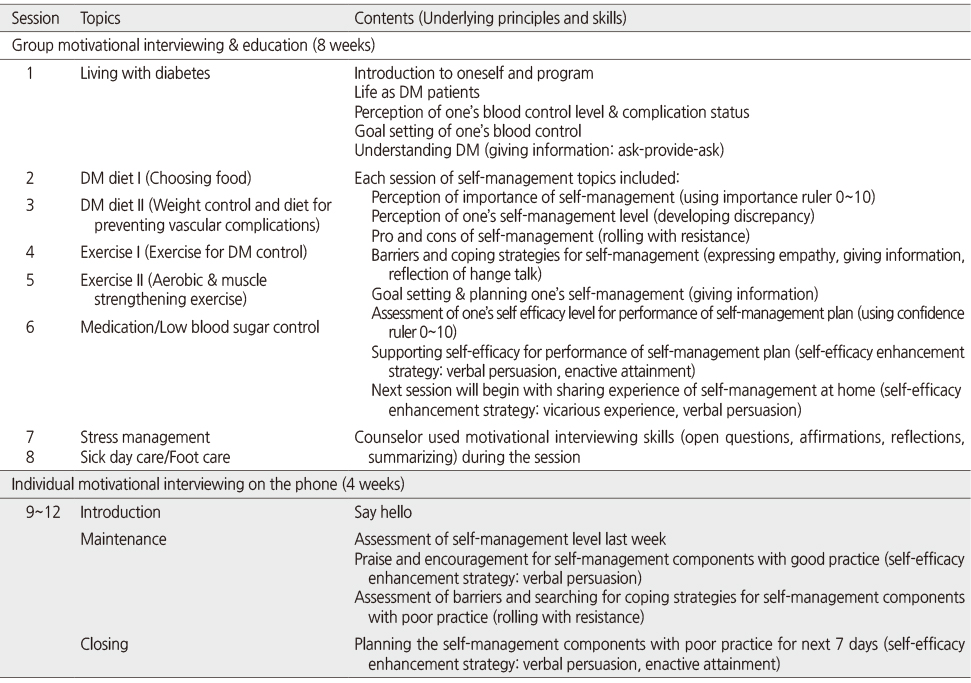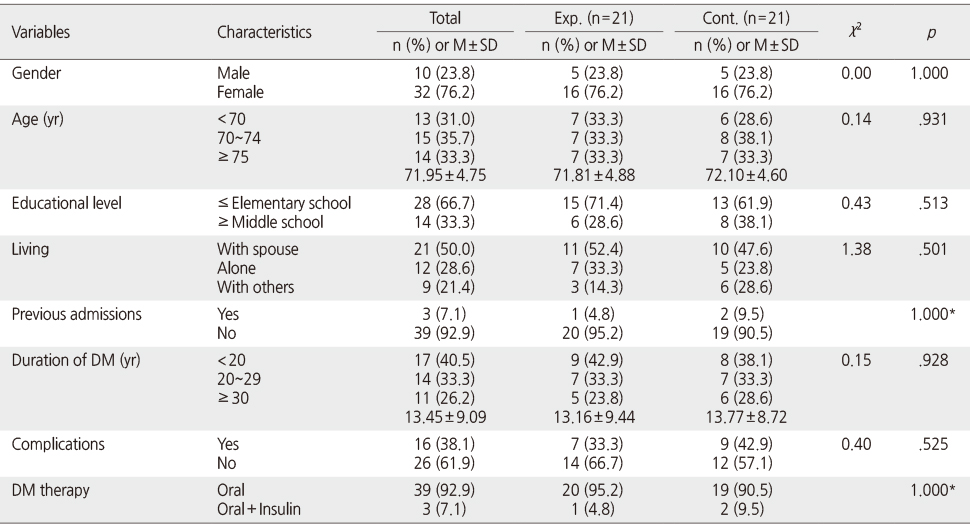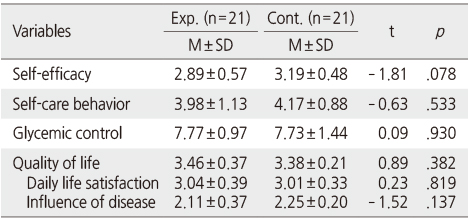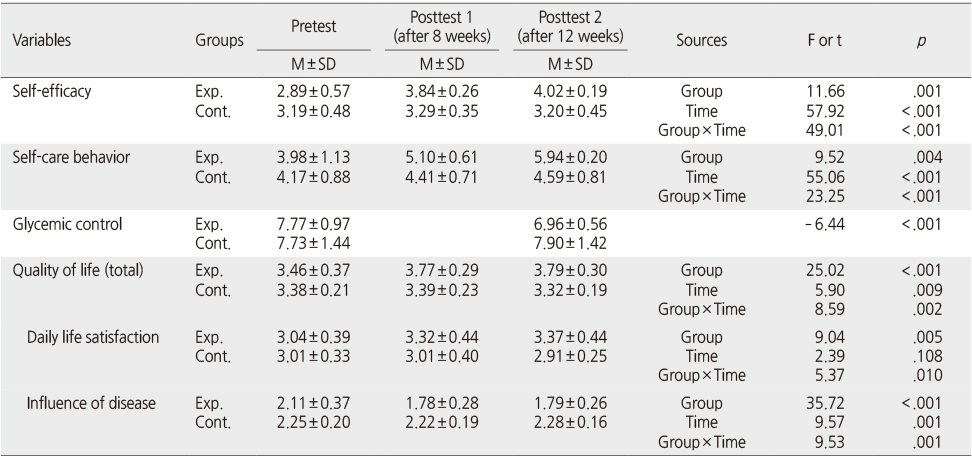Articles
- Page Path
- HOME > J Korean Acad Nurs > Volume 45(4); 2015 > Article
-
Original Article
- Development and Effects of a Motivational Interviewing Self-management Program for Elderly Patients with Diabetes Mellitus
- Hye-Yeon Kang, Mee Ock Gu
-
Journal of Korean Academy of Nursing 2015;45(4):533-543.
DOI: https://doi.org/10.4040/jkan.2015.45.4.533
Published online: August 31, 2015
1Department of Nursing, Daedong College, Busan, Korea.
2College of Nursing · Gerontological Health Research Center in Institute of Health Sciences, Gyeongsang National University, Jinju, Korea.
- Address reprint requests to: Gu, Mee Ock. College of Nursing, Gyeongsang National University, 815-15 beon-gil, Jinju-daero, Jinju 52727, Korea. Tel: +82-55-772-8226, Fax: +82-55-772-8222, mogu@gnu.ac.kr
© 2015 Korean Society of Nursing Science
This is an Open Access article distributed under the terms of the Creative Commons Attribution NoDerivs License. (http://creativecommons.org/licenses/by-nd/4.0/) If the original work is properly cited and retained without any modification or reproduction, it can be used and re-distributed in any format and medium.
Abstract
-
Purpose
- This study was conducted to develop and test the effects of a motivational interviewing self-management program for use with elderly patients with diabetes mellitus.
-
Methods
- A non-equivalent control group pretest-posttest design was used. The participants were 42 elderly diabetic patients (experimental group: 21, control group: 21). The motivational interviewing self-management program for elders with diabetes mellitus developed in this study consisted of a 12-week program in total (8 weeks for group motivational interviewing and education and 4 weeks for individual motivational interviewing on the phone). Data were collected between February 13 and May 3, 2013 and were analyzed using t-test, paired t-test, and repeated measure ANOVA with SPSS/WIN 18.0.
-
Results
- For the experimental group, significant improvement was found for self-efficacy, self-care behavior, glycemic control and quality of life (daily life satisfaction, influence of disease) as compared to the control group.
-
Conclusion
- The study findings indicate that the motivational interviewing self-management program is effective and can be recommended as a nursing intervention for elderly patients with diabetes mellitus.
This manuscript is a condensed form of the first author's doctoral dissertation from Gyeongsang National University.
- 1. Ministry of Health & Welfare. Korea Centers for Disease Control & Prevention. Korea health statistics 2011: Korea national health and nutrition examination survey (KNHANES V-2). Seoul: Ministry of Health & Welfare; 2012.
- 2. Chin YR, Lee IS, Lee HY. Effects of hypertension, diabetes, and/or cardiovascular disease on health-related quality of life in elderly Korean individuals: A population-based cross-sectional survey. Asian Nurs Res. 2014;8(4):267–273. Article
- 3. Korean Diabetes Association. Treatment guideline for type II diabetes mellitus [Internet]. Seoul, Author. 2013;cited 2014 December 12. Available from: http://www.diabetes.or.kr/pro/publish/guide_2013.php?mode=list
- 4. The Diabetes Control and Complications Trial Research Group. The effect of intensive treatment of diabetes on the development and progression of long-term complications in insulin-dependent diabetes mellitus. N Engl J Med. 1993;329(14):977–986. ArticlePubMed
- 5. UK Prospective Diabetes Study (UKPDS) Group. Intensive blood-glucose control with sulphonylureas or insulin compared with conventional treatment and risk of complications in patients with type 2 diabetes (UKPDS 33). Lancet. 1998;352(9131):837–853.ArticlePubMed
- 6. Gu MO. A structural model for self care behavior and metabolic control in diabetic patient [dissertation]. Seoul, Seoul National University. 1992.
- 7. Korean Diabetes Association. Elderly Diabetes Investigation Team. Elderly diabetes mellitus. Seoul: Korea Medical Book Publisher; 2010.
- 8. Kim MK. Factors affecting the self-care behavior of elderly patients with diabetes [master's thesis]. Seoul, Korea University. 2011.
- 9. Bandura A. Social foundations of thought and action: A social cognitive theory. Englewood Cliffs, NJ: Prentice Hall; 1986.
- 10. Song MS, Gu MO, Ryu SA, Kim MS. Effect of a self-care program promoting self-efficacy for community elders with diabetes. J Korean Gerontol Nurs. 2002;4(1):27–37.
- 11. Ko CH, Gu MO. The effects of a diabetic educational program for coping with problem situation on self-efficacy, self care behaviors, coping and glycemic control in type 2 diabetic patients. J Korean Acad Nurs. 2004;34(7):1205–1214.ArticlePDF
- 12. Hong MH, Yoo JW, Gu MO, Kim SA, Lee JR, Gu MJ, et al. A study on effects and their continuity of the self regulation education program in patients with type 2 diabetes. Korean Clin Diabetes. 2009;10(3):187–195.ArticlePDF
- 13. Choi EO. Effects of empowerment education program for the type 2 diabetics on the empowerment, self-care behavior and the glycemic control [dissertation]. Seoul, Seoul National University. 1998.
- 14. Lee HJ, Park KY, Park HS, Kim IJ. The effects of problem solving nursing counseling and intensified walking exercise on diabetic self-care, coping strategies, and glycemic control among clients with DM type II. J Korean Acad Nurs. 2005;35(7):1314–1324.ArticlePDF
- 15. Deakin T, McShane CE, Cade JE, Williams RD. Group based training for self-management strategies in people with type 2 diabetes mellitus. Cochrane Database Syst Rev. 2005;2:CD003417Article
- 16. Miller WR, Rollnick S. Motivational interviewing: Preparing people for change. New York, NY: Guilford Publications; 1991.
- 17. Rollnick S, Miller WR, Butler CC. Motivational interviewing in health care: Helping patients change behavior. Shin SK Cho SH . Seoul: SigmaPress; 2009.
- 18. Hawkins SY. Improving glycemic control in older adults using a videophone motivational diabetes self-management intervention. Res Theory Nurs Pract. 2010;24(4):217–232.ArticlePubMed
- 19. West DS, DiLillo V, Bursac Z, Gore SA, Greene PG. Motivational interviewing improves weight loss in women with type 2 diabetes. Diabetes Care. 2007;30(5):1081–1087. ArticlePubMedPDF
- 20. Calhoun D, Brod R, Kirlin K, Howard BV, Schuldberg D, Fiore C. Effectiveness of motivational interviewing for improving self-care among northern plains Indians with type 2 diabetes. Diabetes Spectr. 2010;23(2):107–114. ArticlePDF
- 21. Welch G, Zagarins SE, Feinberg RG, Garb JL. Motivational interviewing delivered by diabetes educators: Does it improve blood glucose control among poorly controlled type 2 diabetes patients? Diabetes Res Clin Pract. 2011;91(1):54–60. ArticlePubMed
- 22. Lim SC. Motivational interviewing for people with diabetes mellitus. J Korean Diabetes. 2011;12(2):109–112. Article
- 23. Faul F, Erdfelder E, Buchner A, Lang AG. Statistical power analyses using G*Power 3.1: Tests for correlation and regression analyses. Behav Res Methods. 2009;41(4):1149–1160. ArticlePubMedPDF
- 24. Hurley AC. Measuring self-care ability in patients with diabetes: The insulin management diabetes self-efficacy scale. In: Strickland OL, Waltz CF, editors. Measurement of nursing outcomes: Measuring client self-care and coping skills. 4th ed. New York, NY: Springer; 1990. p. 28–44.
- 25. Ferrans CE, Powers MJ. Quality of life index: Development and psychometric properties. ANS Adv Nurs Sci. 1985;8(1):15–24.PubMed
- 26. The DCCT Research Group. Reliability and validity of a diabetes quality-of-life measure for the diabetes control and complications trial (DCCT). Diabetes Care. 1988;11(9):725–732.ArticlePubMedPDF
- 27. Kim SM, Jo YH, Kim ES, Kang YC, Lee HS, Kwak KW, et al. Quality of life in the diabetic patients. J Korean Acad Fam Med. 1991;12(12):25–31.
- 28. Smith DE, Heckemeyer CM, Kratt PP, Mason DA. Motivational interviewing to improve adherence to a behavioral weight-control program for older obese women with NIDDM. A pilot study. Diabetes Care. 1997;20(1):52–54.ArticlePubMedPDF
- 29. Yang JJ. The effects of telephone consulting follow-up on self care behaviors and self-efficacy in diabetic patients. J Korean Soc Health Educ Promot. 2003;20(3):269–280.
- 30. Weinger K, Jacobson AM. Psychosocial and quality of life correlates of glycemic control during intensive treatment of type 1 diabetes. Patient Educ Couns. 2001;42(2):123–131. ArticlePubMed
REFERENCES
Figure & Data
REFERENCES
Citations

- Evaluation of An Oral Health Education Program for Elementary School Students Based on Motivational Interviews
Yi-Seul Kim, Soon-Ryun Lim
Journal of Dental Hygiene Science.2025; 25(1): 31. CrossRef - The Association between the Low-density Lipoprotein-Cholesterol to High-density Lipoprotein-Cholesterol Ratio and the Incidence of Type 2 Diabetes Mellitus in Korean Adults: A Secondary Data Analysis Using a Community-based Cohort Study in Korea
Bo-Kyoung Cha
Journal of Korean Academy of Fundamentals of Nursing.2023; 30(1): 66. CrossRef - Development and Evaluation of Motivational Interviewing Pulmonary Rehabilitation Program Based on Self-Determination Theory for Patients with Chronic Obstructive Pulmonary Disease
Jun Hee Jang, Hye Sook Min
Journal of Korean Academy of Nursing.2023; 53(2): 191. CrossRef - Trends and Effects in Evidence-Based Psycho-Social Interventions for Patients with Diabetes
Jung-won Lim
The Journal of Korean Diabetes.2023; 24(3): 164. CrossRef - Can chatbots help to motivate smoking cessation? A study on the effectiveness of motivational interviewing on engagement and therapeutic alliance
Linwei He, Erkan Basar, Reinout W. Wiers, Marjolijn L. Antheunis, Emiel Krahmer
BMC Public Health.2022;[Epub] CrossRef - Multimodal Diabetes Empowerment for Older Adults with Diabetes
Keumok Park, Youngshin Song
International Journal of Environmental Research and Public Health.2022; 19(18): 11299. CrossRef - The effects of diabetes knowledge, self-efficacy, and depression on self-management in older patients with diabetes in the community: A cross-sectional study
Hyeok Gyu Park, Myoung Jin Kwon
Journal of Korean Gerontological Nursing.2022; 24(4): 389. CrossRef - Asian Best Practices for Care of Diabetes in Elderly (ABCDE)
Sanjay Kalra, Minakshi Dhar, Faria Afsana, Pankaj Aggarwal, Than Than Aye, Ganapathy Bantwal, Manash Barua, Saptarshi Bhattacharya, Ashok Kumar Das, Sambit Das, Arundhati Dasgupta, Guruprasad Dhakal, Atul Dhingra, Fatemeh Esfahanian, Sharvil Gadve, Jubbin
Review of Diabetic Studies.2022; 18(2): 100. CrossRef - Validity and Reliability of Korean Version of the Self-Efficacy for Managing Chronic Disease 6-Item Scale
Sook-Nam Kim, Hyun-Ju Lee, So-Young Kim, Nayoon Lee
Journal of Korean Academy of Nursing.2021; 51(5): 617. CrossRef - Comparing the effectiveness of motivational interviewing and self-development education on type II diabetes mellitus patients’ lifestyle
Javad Kazemi, Fatemeh Rahmati
Journal of Education and Health Promotion.2021;[Epub] CrossRef - Effects of a Physical Exercise Program on Physiological, Psychological, and Physical Function of Older Adults in Rural Areas
Sunmi Kim, Eun-Jee Lee, Hyeon-Ok Kim
International Journal of Environmental Research and Public Health.2021; 18(16): 8487. CrossRef - The role of psychological insulin resistance in diabetes self‐care management
Ancho Lim, Youngshin Song
Nursing Open.2020; 7(3): 887. CrossRef - Influence of Self-care Competency, Family Support, and Depression on Life Satisfaction in Older Patients with Diabetes Mellitus
Gyo Min Lee, So Young Shin
Journal of Korean Gerontological Nursing.2020; 22(4): 326. CrossRef - MALAYSIAN DIABETES PATIENTS’ PERCEPTIONS, ATTITUDES AND PRACTICES IN RELATION TO SELF-CARE AND ENCOUNTERS WITH PRIMARY HEALTH CARE PROVIDERS
Lim Shiang Cheng, Jens Aagaard-Hansen, Feisul Idzwan Mustapha, Ulla Bjerre-Christensen
Malaysian Journal of Medical Research.2018; 2(3): 1. CrossRef - The Effects of a Health Mentoring Program in Community-dwelling Vulnerable Elderly Individuals with Diabetes
Ki wol Sung, Hye Seung Kang, Ji Ran Nam, Mi Kyung Park, Ji Hyeon Park
Journal of Korean Academy of Nursing.2018; 48(2): 182. CrossRef - Health-Related Quality-of-Life and Diabetes Self-Care Activity in Elderly Patients with Diabetes in Korea
Hacksun Kim, Kisook Kim
Journal of Community Health.2017; 42(5): 998. CrossRef - Effect of Diabetic Dietary Education Program on Diabetes Knowledge and Dietary Behaviors of Elderly Diabetic Patients
Ji Young Ye, Sung Hee Min, Min June Lee
Korean Journal of Food & Cookery Science.2017; 33(5): 601. CrossRef - The Effect of a Dementia Preventive Intervention based on Motivational Interviewing among the Elderly over 75 Years of Age in Nursing Homes
Hyun Mi Jo, Suk-Sun Kim
Journal of Korean Academy of Community Health Nursing.2017; 28(3): 260. CrossRef - Effects of Health Literacy and Knowledge on Diabetic Self-care in the Elderly with DM Living Alone
Nan Hui Kim, Youngran Yang, Myung Ha Lee
Journal of Korean Academy of Community Health Nursing.2016; 27(4): 370. CrossRef - The Effects of Motivational Interviewing Training Program on Communication Skills and Self-Efficacy of Home Visiting Nurses
Sungjae Kim, Jeongwoon Yang
Journal of Korean Public Health Nursing.2016; 30(2): 274. CrossRef - The Effects of a Self-care Management Program for Patients with Diabetic Foot Ulcers
Jung Yoon Kim, Eui-Young Cheon
Journal of Korean Biological Nursing Science.2016; 18(2): 78. CrossRef - Development and Application of Motivation-enhancing Self-management Program for Rural Aged with Hypertension
Hailian Zhang, Hyunli Kim
Journal of agricultural medicine and community health.2016; 41(3): 152. CrossRef
Motivational Interviewing Self-management Program for Elderly Patients with DM
DM=Diabetes mellitus.
Homogeneity Test of Characteristics between Experimental and Control Groups (N=42)
*Fisher's exact test; Exp.=Experimental group; Cont.=Control group; DM=Diabetes mellitus.
Homogeneity Test of Dependent Variables between Experimental and Control Group (N=42)
Exp.=Experimental group; Cont.=Control group.
Effects of Motivational Interviewing Self-management Program for Elderly Patients with Diabetes Mellitus (N=42)
Exp.=Experimental group (n=21); Cont.=Control group (n=21).
DM=Diabetes mellitus.
*Fisher's exact test; Exp.=Experimental group; Cont.=Control group; DM=Diabetes mellitus.
Exp.=Experimental group; Cont.=Control group.
Exp.=Experimental group (n=21); Cont.=Control group (n=21).
 KSNS
KSNS
 E-SUBMISSION
E-SUBMISSION




 Cite
Cite

